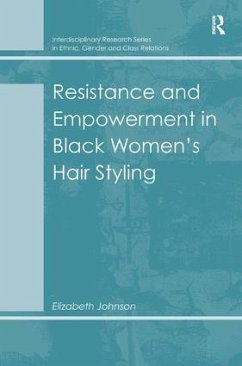Elizabeth Johnson's Resistance and Empowerment in Black Women's Hair Styling develops the argument that one way Black women define themselves and each other, is by the way they style/groom their hair via endorsement by the media through advertisement, idealized identification of Black female celebrities, and encouragement by professional celebrity hair stylists who serve as change agents. As a result, hair becomes a physical manifestation of their self-identity, revealing a private and personal mindset. Her research answers the following questions: What is the relationship between Black females' choice of hairstyles/grooming and transmitted messages of aesthetics by the dominant culture through culturally specific magazines?; What role do the natural hair blogs/vlogs play as a change agent in encouraging or discouraging consumers grooming their hair in its natural state?; What impact does a globalized consumer market of Black hair care products have on Hispanic/Latinas and Bi-Racial women?; Are Black female Generation Y members more likely to receive backlash for failure to conform their hair to dominant standards in their hair adornment in the workplace? Johnson thus demonstrates that the major concern from messages sent to Black women about their hair is its impact on Black identity. Thus, the goal of Black women should be to break with hegemonic modes of seeing, thinking, and being for full liberation. This critical and deep consciousness will debunk the messages told to Black women that their kinky, frizzy, thick hair is undesirable, bad, unmanageable, and shackling.
Hinweis: Dieser Artikel kann nur an eine deutsche Lieferadresse ausgeliefert werden.
Hinweis: Dieser Artikel kann nur an eine deutsche Lieferadresse ausgeliefert werden.








